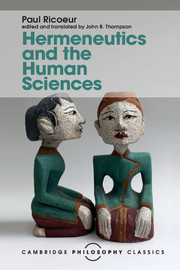Book contents
- Frontmatter
- Contents
- Preface to this edition
- Acknowledgements
- Editor's introduction
- Notes on editing and translating
- A response by Paul Ricoeur
- Part I Studies in the history of hermeneutics
- Part II Studies in the theory of interpretation
- 4 The hermeneutical function of distanciation
- 5 What is a text? Explanation and understanding
- 6 Metaphor and the central problem of hermeneutics
- 7 Appropriation
- Part III Studies in the philosophy of social science
- Select bibliography
- Index
6 - Metaphor and the central problem of hermeneutics
from Part II - Studies in the theory of interpretation
Published online by Cambridge University Press: 05 July 2016
- Frontmatter
- Contents
- Preface to this edition
- Acknowledgements
- Editor's introduction
- Notes on editing and translating
- A response by Paul Ricoeur
- Part I Studies in the history of hermeneutics
- Part II Studies in the theory of interpretation
- 4 The hermeneutical function of distanciation
- 5 What is a text? Explanation and understanding
- 6 Metaphor and the central problem of hermeneutics
- 7 Appropriation
- Part III Studies in the philosophy of social science
- Select bibliography
- Index
Summary
It will be assumed here that the central problem of hermeneutics is that of interpretation. Not interpretation in any sense of the word, but interpretation determined in two ways: the first concerning its field of application, the second its epistemological specificity. As regards the first point, I shall say that there is a problem of interpretation because there are texts, written texts, the autonomy of which creates specific difficulties. By ‘autonomy’ I understand the independence of the text with respect to the intention of the author, the situation of the work and the original reader. The relevant problems are resolved in oral discourse by the kind of exchange or intercourse which we call dialogue or conversation. With written texts, discourse must speak by itself. Let us say, therefore, that there are problems of interpretation because the writing–reading relation is not a particular case of the speaking–hearing relation which we experience in the dialogical situation. Such is the most general feature of interpretation as regards its field of application.
Second, the concept of interpretation seems, at the epistemological level, to be opposed to the concept of explanation. Taken together, these concepts form a contrasting pair which has given rise to a great many disputes since the time of Schleiermacher and Dilthey. According to the tradition to which the latter authors belong, interpretation has certain subjective connotations, such as the implication of the reader in the processes of understanding and the reciprocity between interpretation of the text and self-interpretation. This reciprocity is known by the name of the hermeneutical circle; it entails a sharp opposition to the sort of objectivity and non-implication which is supposed to characterise the scientific explanation of things. Later I shall say to what extent we may be able to amend, indeed to reconstruct on a new basis, the opposition between interpretation and explanation. Whatever the outcome of the subsequent discussion may be, this schematic description of the concept of interpretation suffices for a provisional circumscription of the central problem of hermeneutics: the status of written texts versus spoken language, the status of interpretation versus explanation.
Now for the metaphor! The aim of this essay is to link up the problems raised in hermeneutics by the interpretation of texts and the problems raised in rhetoric, semantics, stylistics – or whatever the discipline concerned may be – by metaphor.
- Type
- Chapter
- Information
- Hermeneutics and the Human SciencesEssays on Language, Action and Interpretation, pp. 127 - 143Publisher: Cambridge University PressPrint publication year: 2016
- 7
- Cited by

